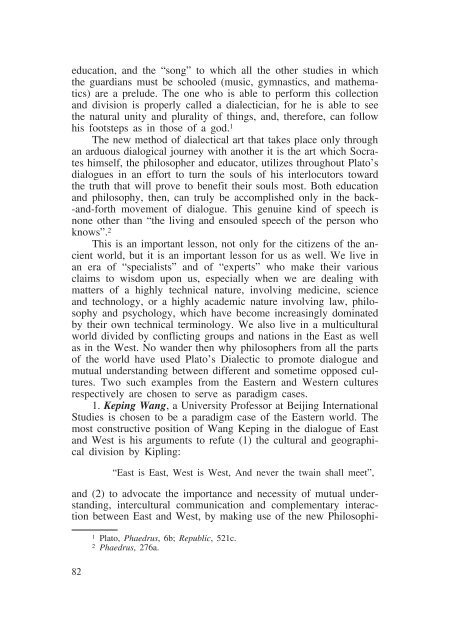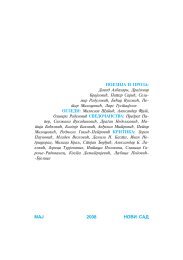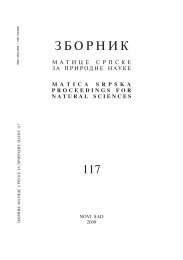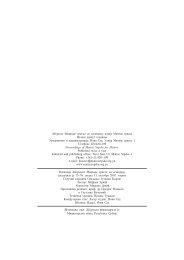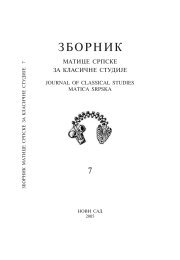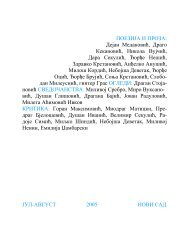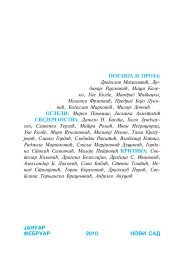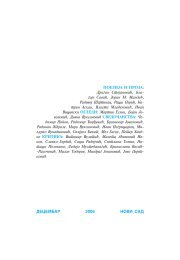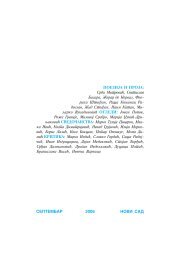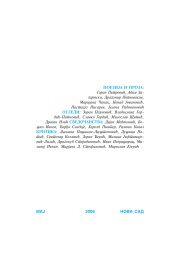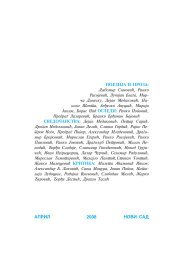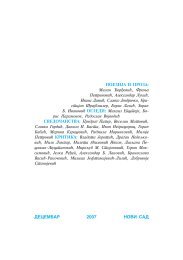- Page 1:
ZBORNIK MATICE SRPSKE ZA KLASIÅNE
- Page 4 and 5:
YU ISSN 1450-6998 | UDC 930.85(3)(0
- Page 6 and 7:
¡¡ Emilia Masson (Paris), Autour
- Page 8:
Zbornik Matice srpske za klasiåne
- Page 11 and 12:
Prireðene i prevedene kwige Ludvig
- Page 13 and 14:
Ÿak Mono: Inauguralna beseda. Leto
- Page 15 and 16:
Kratka „istorija lingvistike" Vat
- Page 17 and 18:
Oblikovawe gråkog åoveka. Verner
- Page 19 and 20:
Planovi za Treãi milenijum: O budu
- Page 21 and 22:
PerÆ cÿsewj u srpskim åasopisima
- Page 23 and 24:
gleskom: Dragoslav Srejoviã' Views
- Page 25 and 26:
Neutaÿiva ÿeð seãawa. Neohelens
- Page 27 and 28:
Za balkansku kwiÿevnu enciklopedij
- Page 29 and 30:
Antiåke helenske teme u savremenom
- Page 31 and 32:
O istorijskom romanu kod Grka. Pred
- Page 33 and 34: Srpski biografski reånik, Novi Sad
- Page 35 and 36: Verska tolerancija i uloga religije
- Page 37 and 38: Milka Iviã, Zbornik za filologiju
- Page 40 and 41: Carl Joachim Classen UDC 821.14'02-
- Page 42 and 43: Hier soll die Frage beantwortet wer
- Page 44 and 45: persönlichen krançw oder cronçw
- Page 46 and 47: (ñxurÁj gÀr moi keìnoj ãm%j 'A
- Page 48 and 49: diese (eben zitierten) Verse zu Ody
- Page 50: während sie für Platon als ein wi
- Page 53 and 54: titles and corollary functions ascr
- Page 55 and 56: subsequent birds, none of which as
- Page 57 and 58: Odysseus' western archipelago befor
- Page 59 and 60: HERMES (Hymns 4, 18, and 29; also 1
- Page 61 and 62: All of this lets us better read det
- Page 63 and 64: in cult, and in iconography. The Fi
- Page 65 and 66: of the central Balkans or across no
- Page 68 and 69: Livio Rossetti SOCRATE ENKRATES UDC
- Page 70 and 71: L'ottimismo socratico sulla capacit
- Page 72 and 73: ma e dopo Socrate e, su questa base
- Page 74 and 75: cente, a mio avviso, nel farci capi
- Page 76 and 77: mettere, reprimere le passioni, o l
- Page 78 and 79: Socrate trova il suo fondamento in
- Page 80 and 81: zava di incrinare le (false) sicure
- Page 82: e propria cultura del controllo del
- Page 87 and 88: anatomy of the city-soul analogy".
- Page 89 and 90: Plato is more concerned about is ho
- Page 91 and 92: In regard to Anton's reference to P
- Page 93 and 94: has tried to understand it — thou
- Page 95 and 96: Randall's general thesis reflects h
- Page 97 and 98: others, of Pletho's Criticism of Ar
- Page 99 and 100: to, which would probably perfect th
- Page 101 and 102: es, and demands something more from
- Page 103 and 104: There may be a paradox here. On the
- Page 105 and 106: elenchus is its examining"; Socrate
- Page 107 and 108: find the truth for ourselves". The
- Page 109 and 110: Soteres Fournaros GREGORY VLASTOS'
- Page 111 and 112: name Aristoteles, he obtained an im
- Page 113 and 114: These passages are generally consid
- Page 115 and 116: pear, although not very frequently,
- Page 117 and 118: persons and why it was only the rel
- Page 119 and 120: To sum up, Aristoteles of Chalcis r
- Page 121 and 122: with joy', 'to rejoice'. However, I
- Page 123 and 124: In the hopeless situation of a smal
- Page 125 and 126: eference a fact: Time demands life.
- Page 128 and 129: Bernard Collette-Duåiã POSTAJATI
- Page 130 and 131: što duša postaje zaneta i kao oma
- Page 132 and 133: oni su sebe u ovom ÿivotu uveÿbav
- Page 134 and 135:
individualne duše s telom. Åetvrt
- Page 136 and 137:
'Gubljenje perja' 24 ili 'biti u ok
- Page 138 and 139:
pada duše. Jedan citat iz Heraklit
- Page 140 and 141:
Kajetan Gantar UDC 94(38):929 Proco
- Page 142 and 143:
Tudi nekatere druge misli, ki jih j
- Page 144 and 145:
njegova „Tajna zgodovina", na sod
- Page 146 and 147:
Emilia Masson AUTOUR D'UN CONCEPT P
- Page 148 and 149:
L'excellent historien des religions
- Page 150 and 151:
«Sur le bûcher, sur lequel le mor
- Page 152 and 153:
«Ensuite il (le prince) va dans le
- Page 154 and 155:
Bharat Gupt UDC 233-242:821.14'02-2
- Page 156 and 157:
The Gift of Vitality For mortals th
- Page 158 and 159:
the miasma that is for impurities,
- Page 160 and 161:
with Pythagoras and his followers.
- Page 162 and 163:
een refused it, but Carudatta true
- Page 164 and 165:
the Greek oracula (manteia, chreste
- Page 166 and 167:
into any hierarchy. There is, of co
- Page 168 and 169:
7 Pitris as protectors: Yajnyavalky
- Page 170 and 171:
Aleksandar Loma LES CHANTS DE L'AU-
- Page 172 and 173:
sonnalité, me provoque à suivre l
- Page 174 and 175:
l'Odyssée suggère que le caractè
- Page 176 and 177:
de, inhabité par et inhabitable po
- Page 178 and 179:
derne 20 ou les démons de midi, 21
- Page 180 and 181:
Et, un peu plus loin: the Sirens
- Page 182 and 183:
chants funèbres et la poésie épi
- Page 184 and 185:
question se pose: les chants héro
- Page 186 and 187:
Chantraine: P. Chantraine, Dictionn
- Page 188 and 189:
na bojnom poqu — tako što ih sam
- Page 190 and 191:
Jasmina Grkoviã-Mejxor UDC 091=163
- Page 192 and 193:
(a) grå. tacuv, tacevw" (1) > stsl
- Page 194 and 195:
od *jõdro 'jedro, jezgro', i dovod
- Page 196 and 197:
GEL: A Greek-English Lexicon of the
- Page 198 and 199:
da i granice slobode. 4 Pošto je r
- Page 200 and 201:
javquju kako ÿele mir, a mira ãe
- Page 202 and 203:
omalovaÿi Bugarsku drÿavu iz vrem
- Page 205 and 206:
Sima Avramoviã UDC 343.63(38) HYBR
- Page 207 and 208:
neko drugog udari jer se na wega na
- Page 209 and 210:
moãniji. To je razlog što su mlad
- Page 211 and 212:
sten od ranije bio u sukobu, 15 ša
- Page 213 and 214:
Time ponovo dolazimo do onih åinil
- Page 215 and 216:
sto, ÿeqa da se zabavi poniÿavaju
- Page 217 and 218:
Sliånosti sa uvredom su, dakle, u
- Page 219 and 220:
ÿivot ukazuje na sklonost za ovakv
- Page 221 and 222:
¡¡¡ Nastojawe da se uporednoprav
- Page 223 and 224:
kom kreativnog tumaåewa pravnih no
- Page 225 and 226:
Georgia Xanthakis-Karamanos THE REC
- Page 227 and 228:
Language The reception of ideas and
- Page 229 and 230:
Webster dictionary says, the Greeks
- Page 231 and 232:
Sandra Duåiã-Collette UDC 821.163
- Page 233 and 234:
correspondence I wish to talk about
- Page 235 and 236:
Text 1: ¶steron dÇ d§ kati»n o
- Page 237 and 238:
New Testament for qualifying Jesus-
- Page 239 and 240:
Sandra Collette-Duåiã KLASIÅNA F
- Page 241 and 242:
oblast juÿno od drugog katarakta)
- Page 243 and 244:
derbergh 1941: 232ff; Vogel 2004: 1
- Page 245 and 246:
u i Kubanu (nalazili su se u zoni p
- Page 247 and 248:
li se prevoz qudstva brodovima uåi
- Page 249 and 250:
Tvrðava Askuta, sagraðena na ostr
- Page 251 and 252:
U politici prema Nubiji vojni i eko
- Page 253 and 254:
puwavani vojnicima regrutovanim iz
- Page 255 and 256:
Uronarti bi mogao da se odredi kao
- Page 257 and 258:
Bietak, M. (1966) Ausgrabungen in S
- Page 259 and 260:
Show, J. — Jameson, R. (1993) Ame
- Page 261 and 262:
The objects of Egypt's commercial i
- Page 263 and 264:
ãe upravo ovaj prilog ukazati na r
- Page 265 and 266:
264 Sl. 2. Dvojne igle sa dvopetqas
- Page 267 and 268:
ski svedok u datovawu ovog sukoba,
- Page 269 and 270:
Es versteht sich von selbst, dass d
- Page 271 and 272:
men von Arbeiten an, die außerhalb
- Page 273 and 274:
Art der spezifischen inneressenisch
- Page 275 and 276:
-Synagoge entdeckte und 1910 veröf
- Page 277 and 278:
tragen. Dies beinhaltet auch die Ve
- Page 279 and 280:
tend. Den ganzen Tag ist er huldvol
- Page 281 and 282:
Ekart Fraj MILOSRÐE PREMA SVIM SIR
- Page 283 and 284:
vremeno u ÿivote qudi, nije moglo
- Page 285 and 286:
Vaÿan argument Anaksimandrove teor
- Page 287 and 288:
G. S. Kirk, J. E. Raven i M. Schofi
- Page 289 and 290:
Dodatno, prema Simplikiju: „Anaks
- Page 291 and 292:
o stabilnosti, izvan promenqivog Sv
- Page 293 and 294:
Druga poslanica je namewena Pitoklu
- Page 295 and 296:
1950. godine, primenio zakone Kvant
- Page 297 and 298:
LITERATURA Aetii, Ton areskonton sy
- Page 300 and 301:
Mirjana D. Stefanoviã UDC 008(091)
- Page 302 and 303:
na ideju kulturne stabilnosti i nep
- Page 304 and 305:
Za progresivistiåka mišqewa dekad
- Page 306:
AUTORI — AUTHORS
- Page 309 and 310:
SPISAK SARADNIKA COLLABORATORS
- Page 311:
Olga Pelcer, Belgrade Boris Pendelj


